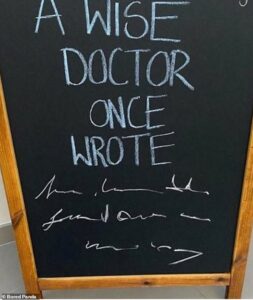 Natural medicine is gaining traction as a viable form of treatment for many ailments. People are excited that there are often low-cost alternative treatments and are encouraged by the fact that so many remedies can be made or used at home.
Natural medicine is gaining traction as a viable form of treatment for many ailments. People are excited that there are often low-cost alternative treatments and are encouraged by the fact that so many remedies can be made or used at home.
With its strengths of focusing on prevention and seeking the root of health problems, natural medicine speaks to those of us trying to take health seriously and avoid the more invasive procedures of conventional medicine, especially for minor problems.
However, the bottom line is that we cannot entirely avoid conventional medicine. In fact, we need it!
And unfortunately for us, conventional and natural medicine are often at odds. Each side falls prey to mistrust, misunderstanding, and pride in a rather vicious cycle. Our culture’s obsession with having opinions on everything means that many people hold strong opinions on a subject without having sufficient knowledge about it. I fear that this has led to many disparagements between conventional and natural medicine. Our views of medicine and the systems that it operates within need a reboot, and that begins with our mindset.
~ Mistrust Sows Misunderstanding ~
 Mistrust between natural and conventional health care is quite common, often caused by someone’s negative experience. Many natural health practitioners question hospitals and their priorities and intentions. Many conventional practitioners view natural health practitioners as dangerous and unscientific. The mistrust is not always misplaced either. Many of us know someone who suffered from an unnecessary or botched procedure or who had a negative reaction to an herbal treatment or other natural protocol.
Mistrust between natural and conventional health care is quite common, often caused by someone’s negative experience. Many natural health practitioners question hospitals and their priorities and intentions. Many conventional practitioners view natural health practitioners as dangerous and unscientific. The mistrust is not always misplaced either. Many of us know someone who suffered from an unnecessary or botched procedure or who had a negative reaction to an herbal treatment or other natural protocol.
However, it is important to separate the practitioners from their system of practice. And while practitioners may be limited by the system in which they work, they are responsible for the protocols they prescribe or administer. But before we blame practitioners for all our problems, another thing to consider is that there are always unknowns when working with the human body. Each person is unique, and negative reactions to a given remedy or procedure can be unexpected. This may not be the failure of natural or conventional medicine but rather the unique makeup of the individual.
Painting all practitioners or entire medical systems with a broad brush is unfair. A knee-jerk reaction to any negative experience in which either side paints the other side as ignorant or bad-intentioned is something we need to avoid. And unless the experience happens to us, we rarely know the full story.
~ Misunderstanding Sows Mistrust ~

Misunderstanding is another common problem. This is often as simple as a lack of knowledge. Each practitioner will use the tools available to him and will be less informed about the tools provided by other practitioners. Assuming that every medical professional has all the answers is simply not realistic, and it may be best to avoid those practitioners who think they do know everything.
Remember that just because a treatment is unfamiliar doesn’t automatically mean it is ineffective. Measuring either conventional or natural medicine by the standards of the other also leads to misunderstanding. Natural health may not have many double-blind, placebo-controlled studies supporting some of its practices, but it has other forms of evidence for its effectiveness, such as historical precedent and tradition. Conventional medicine has excelled at specialization, which is often foreign to holistically minded natural health practitioners, but that doesn’t mean specialization is unhelpful.
Misunderstandings may even be exacerbated by us, the patients utilizing these protocols. We may misunderstand a protocol or dosage schedule and then blame the system or practitioner if it fails.
~ Pride and Peer Pressure ~
 Finally, pride permeates each medical system, fed by the misunderstanding and mistrust we discussed above. And I hate to break it to you, but we all suffer from this pride.
Finally, pride permeates each medical system, fed by the misunderstanding and mistrust we discussed above. And I hate to break it to you, but we all suffer from this pride.
The desire to make everything black-and-white, the desire to make sure our opinions are heard and acknowledged, the incapacity to accept positive criticism, and the desire to be right are all symptoms of pride.
Our conventional and natural health providers are not without this, too; they are human after all. Unfortunately, a stubborn pride in medicine, conventional as well as natural, can have harmful effects, and clients and patients often suffer the consequences.
But we all suffer the consequences of pride. We all think we are right when it comes to health concerns, medical practitioners included. This is quite prevalent online especially. Any mention of home birth, vaccines, or cancer treatment can bring out the comment trolls. As finite human beings, we must acknowledge that we do not know everything.
~ Mindset Shifts ~

While it may seem like there is no way forward in this regard, never fear! Here are some mindset changes we can make to help bridge the gap and encourage the use of conventional and natural medicine together.
Conventional and natural medicine are both wonderful tools at our disposal. They may be used in any way we choose to aid the health of ourselves and our families. While we will never agree with everything either side has to offer, a good mindset is to view the systems as neutral tools with unique pros and cons.
Not every tool in the shop has the same function, so we need to embrace the differences, manage our expectations, and use what we have to our advantage. A wrench may be used to hammer in a nail, but is that its ideal function? It may get the job done, but there could always be a hammer lying around. How we use each tool of medicine is completely up to us and our comfort level.
We can accept the use of both systems together to reach our health goals. It is all too easy to get bogged down with any problems we may run into doing so. Being drained and weary with things we may not be able to change is disheartening, but take courage! Remember, it takes years for change to happen in the medical world.
 Give practitioners on both sides the benefit of the doubt. Remember, many practitioners care deeply for their patients and want them to receive excellent care. While there are always bad apples, that does not reflect on doctors as a whole, and we must approach them with kindness and grace. We should assume that they have our best health outcomes in mind unless we have good reason to believe otherwise. The good intentions of our health practitioners should never override our own values when it comes to health, but being respectful and kind to our practitioners is still important.
Give practitioners on both sides the benefit of the doubt. Remember, many practitioners care deeply for their patients and want them to receive excellent care. While there are always bad apples, that does not reflect on doctors as a whole, and we must approach them with kindness and grace. We should assume that they have our best health outcomes in mind unless we have good reason to believe otherwise. The good intentions of our health practitioners should never override our own values when it comes to health, but being respectful and kind to our practitioners is still important.
Another thing we can do is to stop treating experts as authorities. We can simply view our doctor or natural health practitioner as a member of our health care team. They are important because of the knowledge and expertise they possess, but they do not rule us. None of us can know everything, so it’s great to have experts around to help us make decisions. We can gather information from them; that’s what they are there for!
But the final authority lies with us. We can choose to decline or accept any treatment or protocol. Our voice is just as (if not more) important as our chosen health practitioner’s. We should expect pushback from a given practitioner in either system and be ready to politely decline treatment or even change practitioners. It is important to stand up for ourselves, trust our instincts, and advocate for what we want.
Written by Annie Scaife for Intellectual TAKEOUT ~ June 18, 2024
